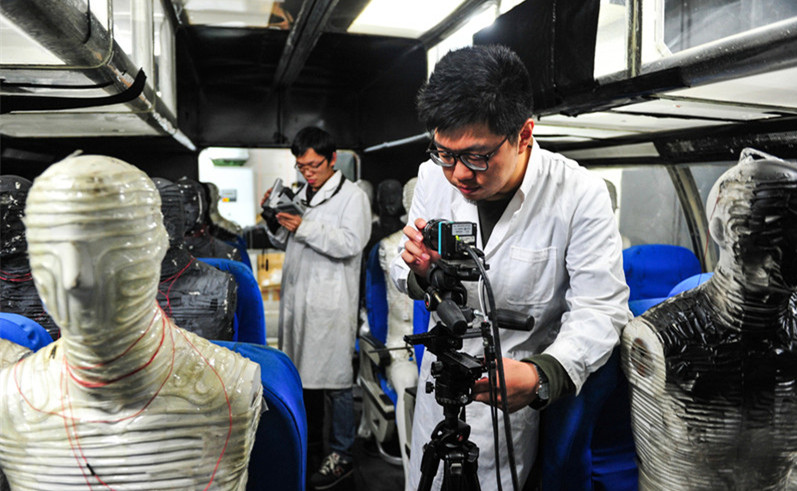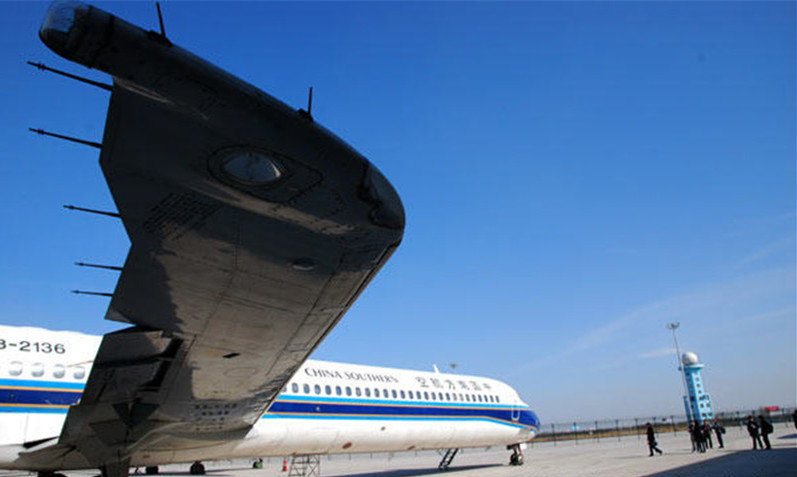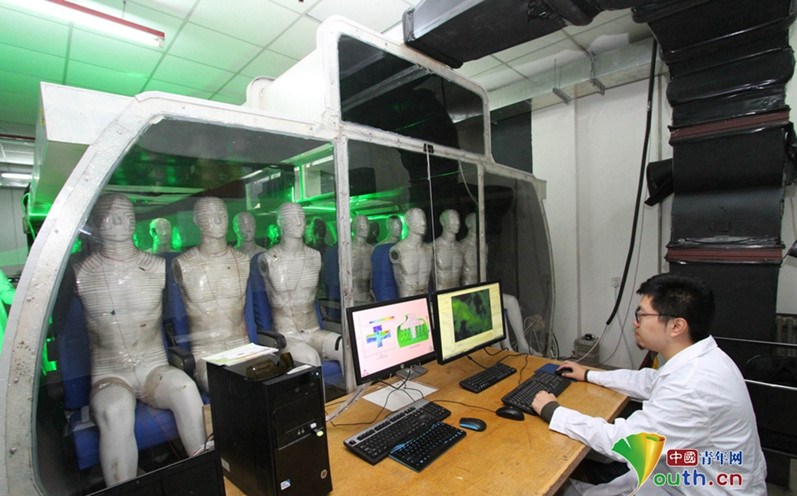Tianjin University Designs a Clean “Lung” for C919
The Chinese jet-liner C919 completed its maiden flight on May 5. The C919’s performance is superior to most other similar aircraft, especially its innovative air distribution system that provides cleaner air to passengers. The in-cabin air freshness of the C919 is improved by 20% compared with that of other traditional large aircraft.
Designing the “Respiratory System” of the C919
A Tianjin University scientific research team developed the air environment control system in the cabin and the “respiratory system” of the C919, including mathematical simulations and optimal design.

The researchers monitoring the cabin in the experimental platform for simulating the cabin air environment
The Tianjin University research team has conducted many scientific analyses to simulate and optimize in-cabin air distribution, which is a key part of the air environmental control system, to make sure that all passengers could enjoy clean and comfortable air no matter where they sit.
According to Liu Junjie, a professor at the School of Environmental Science and Engineering at Tianjin University, one of the highlights of the C919 is the new air distribution system which provides passengers with cleaner, fresher and more stable air. The air outlets have adopted the latest design which simultaneously circulates air from the top of the cabin and the side of the luggage rack. It can not only accelerate the flow of the air but also reduce passengers’ discomfort caused by uneven temperature.
“Airbus and Boeing mainly take into consideration Westerners’ body temperature sensitivity, while the C919 has accumulated more data concerning Chinese people’s body temperature sensitivity,”Liu added.
Exclusive Experimental Cabin Platform
Research on cabin air environment control systems in the international civil aircraft industry is mainly done by relevant specialized research institutions at companies such as Boeing and Airbus. The Boeing 787 can control the humidity and cleanliness of the air inside the cabin, while other types of aircraft only control the temperature of the in-cabin air. At the beginning of China’s initiative on large civil aircraft, there was no research platform specially for the cabin environment.
In 2008, Chen Qingyan, former participant in the Chang Jiang Scholars Program and a professor at Purdue University in the United States, was invited to be a guest professor at Tianjin University. At that time, he was also the director of the American Airliner Cabin Environment Research Center, which plays a leading role in the airliner cabin environmental control field.
The only requirement of Chen to work at Tianjin University was “an airworthy aircraft”. Tianjin University immediately met with his requirement, purchasing a MD-82 aircraft, and thus established the only experimental cabin platform made up of a whole aircraft in the world. It was used to simulate and optimize the air distribution system of the C919 in 2009.
"We hoped to start with basic research and make a solid contribution to large airliner design in our country," Chen Qingyan said. Today, the Cabin Air Innovation Center led by Chen Qingyan at Tianjin University, has already reached a considerable size and has gathered together a number of young Chinese scholars.

The McDonnell Douglas 82 aircraft at Tianjin is the world's only experimental research cabin platform made up of an entire aircraft.
Cabin Design Enhances Comfort
Liu Junjie is the director of the Tianjin Municipal Key Laboratory of Monitoring of Indoor Air Quality, and also a close working partner of professor Chen Qingyan.
"Our goal is to make the most comfortable and the cleanest cabin air environment in the world. People used to focus on whether a plane can fly, and how fast a plane can fly. However, now the focus has shifted to safety, comfort, and health", Liu said.
The cabin air environment control system is one of the nine critical systems of an aircraft and also a key technology involved in classified information. Since 2009, faculty and students at Tianjin University have begun to pay close attention to the science and technology of large aircraft cabin air environmental control and design. Liu added, "At the beginning, in this field, there were neither research foundations nor experimental platforms, let alone verification devices in China. We had to start from scratch."
The "reverse simulation and design method" proposed by Chen Qingyan is now applied to the homegrown airliner, the C919. At that time, the design concept was different from those of Boeing and Airbus, and others. It does "not only expect passengers to passively adapt to the environment, but considers the comfort of passengers, designing the cabin environment according to passengers' needs".

Laser detection tests are run on a cabin with seven rows of seats.
Tianjin University simulated cabin air environment laboratory tested a cabin with seven rows of seats using the arrangement of the seats in the C919. Each seat in the cabin has a life-size model in it, and the model is wrapped in wires to generate simulated body heat. The reserach team constantly tested to find the ultimate purified using the fewest air vents.
Traditional civil aircraft always exchanges air from air distributors on the top of the cabin, which causes passengers in different positions to unevenly feel hot or cold, and worse still vortexes at windows lead to the retention of pollutants and infectious germs. However, the C919 supplies air simultaneously from the top and side racks, meaning that such vortexes cannot be formed and it also blocks longitudinal flows in the cabin, thus the C919 not only reduces the probability of spreading sicknesses among passengers in the cockpit but also makes the air in the cockpit "clean, pure, and fresh", says researchers.
"Although China's aircraft industry started late, by conducting studies into the key common and fundamental problems, and by making breakthroughs, we will be able to walk at the forefront of world competition", Chen Qingyan said.

